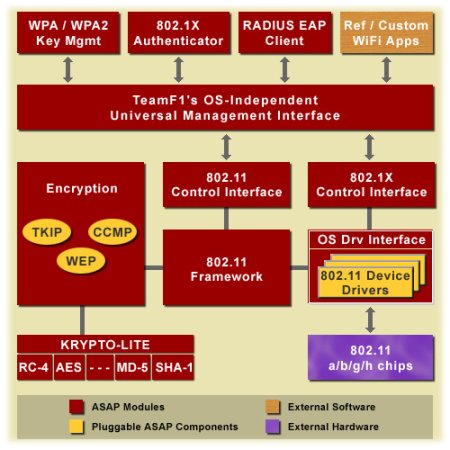Wi-Fi stack targets wide range of embedded Linux devices
May 18, 2005 — by Henry Kingman — from the LinuxDevices Archive — viewsTeam F1 is shipping Linux middleware for OEMs that want to add secure, managed 802.11a/b/g access point capabilities to devices of all kinds. The Air Secure Access Point (ASAP) stack supports 2.4- and 2.6-series Linux kernels, and integrates the latest security and management features, along with a flexible driver framework, the company says.
According to Team F1, ASAP provides a flexible API that can be used in typical access points (APs), managed carrier-grade APs, or to add Wi-Fi capabilities to devices such as printers, conference-room projectors, industrial devices, hard-to-reach devices such as radio link hardware, network-attached storage, VoIP base units, and APs requiring separate attributes for traffic from different clients.

ASAP architecture
Team F1 co-founder Mukesh Lulla says that despite high consumer demand, embedded vendors have been slow to add Wi-Fi capabilities. “Embedded device designers [have held back] from adding access point services not [because of a] lack of customer demand, but [due to] lingering doubts about security and the significant hurdle in supporting and managing the various generations of IEEE 802.11 security and Wi-Fi standards in operation at the typical customer's site,” Lulla said.
Supported protocols in ASAP include:
- WEP, WPA, WPA2 / IEEE 802.11i
- CCMP, TKIP + MIChael, WEP-40 and WEP-104 bit cipher
- Dynamic WEP re-keying for non-WPA STAs with IEEE 802.1X
- WPA and WPA2/802.11i key management
- WPA-Personal (PSK) and WPA Enterprise (802.1X) modes
- Simultaneous support for non-WPA and WPA/802.11i supplicants
- Krypto-Lite, TeamF1's FIPS-certified common crypto framework, along with a
suite of encryption and integrity components to secure and manage access
point traffic - Built-in RADIUS client
- IEEE 802.11 framework with quality of service (QoS IEEE 802.11e) support
and wireless multimedia (WMM) support - reference Wi-Fi drivers for IEEE 802.11 a/b/g chip sets
- IEEE 802.11d support for Wi-Fi use in international WLAN systems
Lulla says ASAP supports a wide range of wired and wireless chips through a flexible driver framework that enables MadWifi drivers for various 802.11 chips to be “seamlessly integrated.”
Team F1's Linux move
Team F1 announced in April that it would port all its products to Linux, in response to customer demand. Its offerings include:
- X-Caliber PNAC (port-based network access controller)
- V-IPSecure VPN (virtual private network) stack
- Grand-PPPrix PPP stack
- INSECTS firewall and NAT stack
- AuthAgents Kerberos and X.509 authentication agents
- SSecure SSL, SSH, and IPsec/IKE stack
The last three components are available as add-ons for ASAP, Team F1 says.
Lulla notes that Team F1's Linux-compatible products help its customers add targeted value. The company is porting its products to Linux largely without help from a commercial embedded Linux support provider, and says the biggest challenges have been the lack of standard BSPs, and the logistics of getting appropriate toolchains for non-X86 hardware that work with various kernel versions.
Lulla notes, “Using commercially supported distributions for specific CPU platforms (non-X86) [is] easier [than] putting together distributions and toolchains for development internally,” adding that the company has tried both approaches.
Availability
ASAP is available immediately, for Linux and VxWorks, and has been validated PowerPC, MIPS, X86, and ARM/XScale, Team F1 says.
This article was originally published on LinuxDevices.com and has been donated to the open source community by QuinStreet Inc. Please visit LinuxToday.com for up-to-date news and articles about Linux and open source.